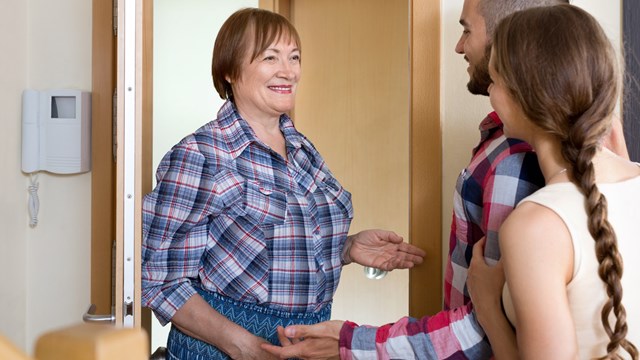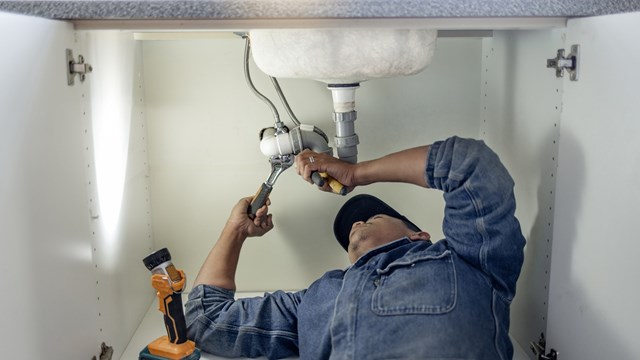Americans have a long history of pride in personal independence and individual rights. Since the break with English rule two centuries ago platitudes like, “A man’s home is his castle,” and “live and let live” have existed side-by-side with the desire to also provide for the smallest and weakest in our communities.
Children, the aged and disabled individuals are often not able to live and let live comfortably and safely without special consideration and plans; plans for everyday quality of life issues, and plans for emergencies or extenuating circumstances.
How such plans are put in place and brought to fruition in individual and private homes is a different scenario from the mechanisms employed in multifamily communities, such as condominiums or co-ops. Homeowner, condo owner association boards, property management companies, and individual residents have distinct protocols and laws to consider when safety and security is the issue for those most vulnerable within the community.
Know the Law
It is not only helpful, but essential for a condominium board to have a working understanding of the local, state and federal laws impacting their residents with special needs or disabilities. Legal counsel should be able to answer questions and direct actions when safety and emergency plans are discussed at regular meetings. The Americans with Disabilities Act (ADA) first signed into law in 1990 is administered under The Department of Justice (DOJ) and is an additional resource.
As a civil rights law, the ADA can provide important guidelines on topics such as reasonable accommodations for the disabled and what constitutes discrimination. There can be very expensive consequences for condominium properties and board members if ADA is not interpreted correctly. It is important to remember ADA is not a static field, and changes and modifications may be enacted at any time. Title III, pertaining to private industry, and any place of public accommodations such as lodgings, education, and recreation can also provide helpful guidelines and information for boards.
The Federal Fair Housing Amendments Act (FHAA) is an additional source of valuable information for community associations. Even associations not covered under the ADA will still have obligations to owners and residents under the FHAA of 1988. The penalties for non-compliance are specific, and serious. If an association is found in violation of the ADA or the FHAA, fines may be imposed—and they start at $50,000 and go up in increments of $50,000. The best tools in matters pertaining to the ADA and FHAA is excellent legal counsel and a proactive attitude. Once an association has a good understanding of what is required by law, quality of life issues may be addressed in order to showcase a community’s amenities and special programs with regard to safety and security in more general terms.
Individual Approaches
The proactive approach is the choice one central Florida property has used to create a desirable planned community of 1,183 residences. Oakstead in Central Pasco County, north of Tampa, is comprised of single family homes and condominium 'villas' scattered over nine separate gated villages. Park Director Nancy Intini overseas the common pool, clubhouse and recreational areas of the decade-old development. Originally developed with county bond funds and set up as a Community Development District (CDD), Oakstead is not unique as Florida developments go. In addition to the CDD, there is a community-wide HOA, and each individual village has a specific HOA. The layers of government and division of responsibility keep Intini on her toes, but she is well-versed in safety and security at every level.
“Residents enter the clubhouse and pool facility with a personalized 'thumbprint' identity system,” she says. “Residents must sign guests in and accompany them during the visit.” In addition to the adult pool, there are tennis courts, and sports fields. A playground and children’s pool were developed for the youngest residents with careful attention to safety features. The shallow children’s pool has easy ramp access to benefit all children, regardless of physical ability, and the playground has a heavy application of rubber mulch to cushion spills and falls. The public does not come and go on a regular or uninvited basis, and all children must be accompanied by an adult.
Intini brings several outside vendors on to the property annually for family and children’s events. Swim and tennis lessons, holiday pool slides and bouncy houses, as well as seasonal “ice” skating rinks are examples of the community events she runs. In order to gain access as a vendor, full coverage insurance and background checks are required as a safety and security measure. In-house, Intini arranges for annual Santa visits and Easter egg hunts, Memorial and Labor Day cookouts, and even fall hayrides. These events all carefully address safety and security for the entire spectrum of senior adults to the smallest children, and disabled residents. When she lists an event in the community newsletter as “fun for all,” it has been completely vetted for security purposes.
The Pasco Aging Network (PAN) created in 1989, serves Intini’s Central Florida area by providing information on services, and networking opportunities for seniors. CARES is another go-to senior organization serving West Central Florida with services ranging from social to medical in-home care.
Brenda Cassato is executive director of Senior Information Resources, which provides services to those in the Tampa Bay and St. Petersburg area. PAN and CARES are just two of the resources Cassato, a baby boomer herself, uses to help educate seniors, caregivers, and interested community members, as well as boards and associations. Cassato has organized free, senior-centric workshops since 2005. She understands quality of life issues, and maintaining standards and safety especially during retirement. Finding solutions to allow residents to age in place, in the communities they have chosen is a key goal for Cassato.
More Resources
One way Cassato assists COAs and HOAs in identifying and managing safety concerns for seniors is by arranging local health fairs in conjunction with area hospitals. In addition to health screenings, Cassato makes sure there are classes on resources such as preventing falls, safe cooking, and transportation options. She is an advocate for the “Phone a Friend” program, an all-volunteer operation where seniors and shut-ins receive a call daily, at the same time every day. If there is no answer, there is a set protocol to follow to ensure the resident is indeed safe, or to arrange for any and all emergencies.
Cassato also stages “roundtable discussions” for communities and has had as many as two hundred residents and concerned family members attend. She assembles experts from elder affairs and related fields such as Medicare, home health, nutrition, attorneys, and financial planners. “Residents can have concerns answered in an easily accessible, user friendly environment.”
Another excellent resource for senior safety is The Florida Geriatric Care Managers association, Inc. (FGCMA). The state wide FGCMA (www.fgcma.org) works towards a goal of dignified care and safety for Florida’s seniors and their families.
It is a not–for- profit organization of professional practitioners founded in 1993. This agency offers training, assisting, regulating, educating, and supporting services through qualified care managers for the state of Florida. Joanna Davis is the current president of FGCMA. With a background in Gerontology, and a certification in Care Management, Davis is also the executive director of Chart Your Own Course, Ltd. Co., in Tarpon Springs on Florida’s Gulf Coast. She has worked in the field of elder care since 1997.
“It is a passion, and takes a special type of person,” she says simply. As the president of FGCMA, Davis is responsible for the day-to-day operation of services offered for the care, safety and comfort of seniors. FGCMA is part of NAPGCM, the National Association of Professional Geriatric Care Managers, and a national non-profit whose mission is to advance professional geriatric care, and help seniors and their families adjust to the challenges of aging.
Aging in Place
While safety is just one challenge, it is an extremely important one. All geriatric Care professionals agree, aging in place is the desired goal for most if not all seniors—as long as health and safety requirements can be managed in the home environment.
”Boards have an ethical responsibility to supply knowledge, and not put up roadblocks for people,” states Davis. She suggests boards develop a sense of awareness, not necessarily responsibility, but awareness.
Isolation may be masking a problem, if a resident is not as active or visible in the community it may be a red flag. “If newspapers and mail have piled up, check for emergency contact numbers and family member’s information. Pick up the phone and make a call.”
Hoarding is often a sign of physical and/or mental deterioration, and extreme cases can become a safety hazard for other units and residents if pests or fire becomes an issue. “If there are signs of hoarding, call an emergency number,” advises Davis.
Emergency plans and hurricane evacuation routes should be reviewed annually as part of a board’s routine safety and disaster preparedness procedures. When mechanisms and protocols are put in place, reviewed, and updated on an annual basis it is possible to manage everyday routines and emergencies, while providing for the youngest, the oldest, and those in the community with handicaps and challenges. As Davis says, You can be neighborly without assuming responsibility.” n
Anne Childers is a freelance writer and a frequent contributor to The South Florida Cooperator.







Comments
Leave a Comment